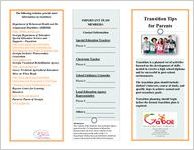The following websites provide more information on transition:
Department of Behavioral Health and Developmental Disabilities (DBHDD) https://dbhdd.georgia.gov/ Georgia Department of Education Special Education Services and Supports--Transition http://www.gadoe.org/CurriculumInstruction-and-Assessment/SpecialEducation-Services/Pages/Transition-.aspx Georgia Inclusive Postsecondary Consortium www.gaipsec.org Georgia Vocational Rehabilitation Agency https://gvra.georgia.gov Career Technical Agricultural Education/ Move on When Ready http://www.gadoe.org/CurriculumInstruction-and-Assessment/CTAE/Pages/ Transition-Career-Partnerships.aspx Regents Center for Learning Disorders http://www.rcld.uga.edu/ Parent to Parent of Georgia www.p2pga.org
IMPORTANT TEAM MEMBERS:
Contact Information
Special Education Teachers Phone # ____________________ ___________________________
Classroom Teacher Phone #____________________ ___________________________ School Guidance Counselor Phone # ____________________ ___________________________ Local Education Agency Representative Phone # ____________________ ___________________________ Others:____________________ ___________________________
Disclaimer The contents of this brochure were developed under a grant from the U.S. Department of Education, H323A120020.;however, those contents do not necessarily represent the policy of the U.S. Department of Education and individuals should not assume endorsement by the Federal Government .
Transition Tips for Parents
Transition is a planned set of activities focused on the development of skills needed to receive a high school diploma and be successful in post-school environments. The transition plan should include: student's interests, course of study, and specific steps to achieve annual and post-secondary goals. Transition planning should begin before the formal transition plan is required.
205 Jesse Hill Jr. Drive SE Atlanta, GA 30334
Local (404) 656-2800 Toll Free: (800) 311-3627 (GA)
www.gadoe.org
Transition Requires...
Support from multiple sources for the student and his/her family to make choices, develop connections, and access services
Development of a transition plan by the time the student begins ninth grade or turns 16, whichever comes first
The Individuals with Disabilities Education Act (IDEA) provides opportunities to:
Encourage your child to think about the future and what they want to do after high school
Plan high school experiences which prepare your child to reach their desired goals for adulthood
Connect to support and services that your child may need in the future
Supporting your child
with transition
Discuss your child's strengths and interests
Set goals for life after high school, such as: employment, training, college, and/or independent living, etc...
Meet with school counselors to discuss assessment results and graduation requirements
As you attend your child's IEP meetings and plan for transition, you are selecting goals, activities, and services over the course of the next year. You do not have to be as specific in the early part of high school as you will be when closer to graduation. Annual goals should include intentional planning to support the student's post-secondary goals.
What can I expect at IEP meetings when transition is discussed?
Planning for reaching your child's post-secondary goals
Participation of the parent and student in the meeting is very important
Ask questions and voice your opinion
In addition to covering the typical elements of an IEP, discussion may include information about:
Career Clusters & Pathways Move on When Ready Georgia Vocational
Rehabilitation Agency (GVRA) Department of Behavior Health & Developmental Disabilities (DBHDD)
